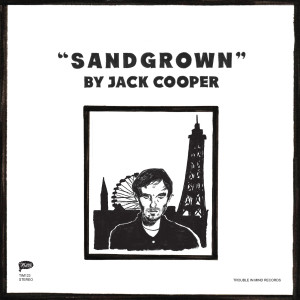 Jack Cooper’s two-man band Ultimate Painting has made three albums and is working on a fourth, but in the meantime he has released his first solo album. Sandgrown is a song cycle that paints a sonic picture of his hometown, the port city of Blackpool on the Lancashire coast in northwestern England. This is a quiet record, what might have been termed shoe-gaze in the ’90s, with lo-fi production and Cooper apparently playing all of the instruments and singing all of the vocals.
Jack Cooper’s two-man band Ultimate Painting has made three albums and is working on a fourth, but in the meantime he has released his first solo album. Sandgrown is a song cycle that paints a sonic picture of his hometown, the port city of Blackpool on the Lancashire coast in northwestern England. This is a quiet record, what might have been termed shoe-gaze in the ’90s, with lo-fi production and Cooper apparently playing all of the instruments and singing all of the vocals.
(To digress a moment, I first heard of Blackpool on the debut solo album of another singer from the North of England, one Graham Nash’s Songs For Beginners. I suspect the same is true for many of my generation.)
The first single is “North Of Anywhere,” a soporific waltz with a hypnotic central lick and a repeated refrain of “I need a sign.” One sign of a top-notch lyricist (poet, really) is the ability to put together lines that can be taken in many different ways, and this is one of them. “This isn’t a protest song,” he starts out, “I need a sign.” Is that a literal sign, or a metaphoric one? Does he need something to wave in the streets, or somebody to tell him what to do? By the next verse he’s confusing things further, and giving us the stanza that gives the song its title: “Too far north of anywhere / just follow the sign / so north we don’t even care / I need a sign.”
Or maybe that first line is “This is a protest song.” The album was recorded on tape with a four-track machine, so like so many lo-fi records in the ’90s when Cooper was coming of age, it’s hard sometimes to make out the lyrics. It’s all part of his plan, he says. The songs evoke the things he saw and did while working on the seaside promenade in Blackpool, which by the time he came along was a dying tourist town. “I’ve been trying to do this record since I was about 18,” he says. “I bought my first four-track with the proceeds of a summer working on the promenade and I guess I got sidetracked along the way.”
Here’s “North of Anywhere.”
The rest of the nine tracks build on that theme. “Gynn Square” is a shuffling folk-rock tune whose music and lyrics evoke the rhythm of the sea, and has some more fun with the language: “The seawall breaks another wave, goodbye,” goes the refrain. “Wave goodbye” is of course what he did to Blackpool. Amid the cheesy organ and maracas of “Stranded With The Fleetwood Blues” he tells us that he had to leave the stifling, dying place: “If I stay, I’d disappear,” he intones. Wordplay features prominently in “A Net,” a dreamy, swampy, Creedence-like slow rocker in which it’s unclear whether he’s singing “a net” or “Annette.” It’s a bit of an homage to the Velvet Underground, with a dissonant lead guitar stabbing in as if to comment on the noirish lyrics.
“On A Pier In The Wind” is a Kinks-influenced folk-rocker in a pastoral vein, with the pastures replaced by the waterfront. “Estuary” is the most pop-like tune, a slice of ’60s radio-friendly melody with a sing-song tune, except it has a psychedelic setting of reverberating guitars and droning organ, and unsettling, symbol-laden lyrics. Great fun and very infectious. The final track, “Memphis, Lancashire” is even more psychedelic, with shades of early Fairport Convention or Jefferson Airplane and an inspired high-mercury-style guitar solo by the lead guitar, over the heavily reverbed rhythm guitar. The two-part instrumental from which the album draws its title, “Sandgrown” parts 1 and 2, are gently loping tunes, very Summer of Love.
So, American rockers like Ryley Walker and The Decemberists are paying homage to ’60s English folk-rock, I guess it makes sense that English musicians do the same with American psychedelic folk-rock. Circle of Life, as they say. Not to make light of it. Sandgrown is a wonderful album to put on and zone out to the meandering guitars, or try to parse out the lyrics, just like we used to do back in the day.
(Trouble In Mind, 2017)
